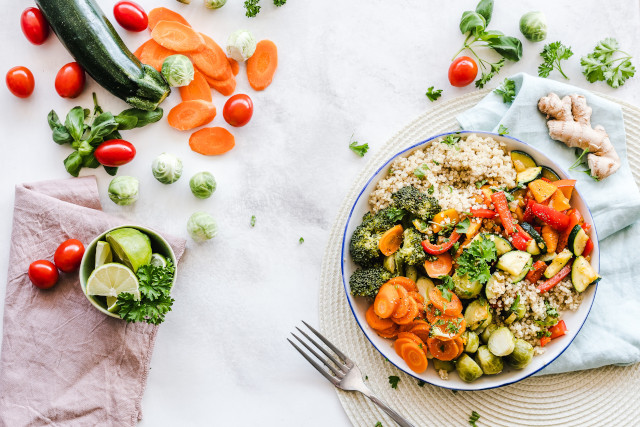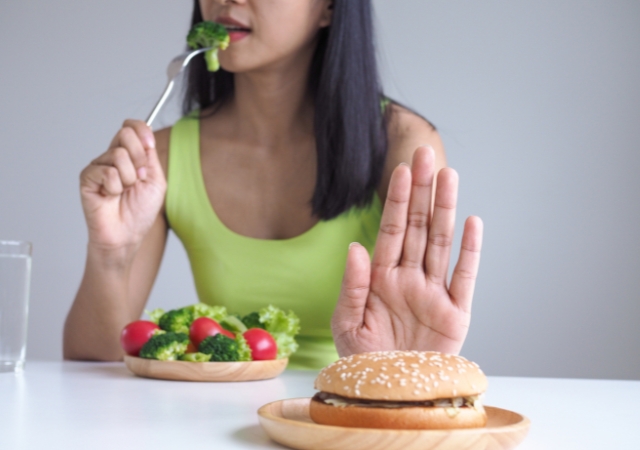
Coffee has been one of people’s favourite beverages for generations. We love this bitterly pleasant beverage. Here’s one statistic from last year to prove that: the average annual global consumption up until 2020 reached more than 400 billion cups. Since its earliest discovery, allegedly in Ethiopia, the variety of coffee has increased manifold. But the ways to consume coffee have multiplied for many times more.
Not only did people invent novel espresso drinks outside of traditional latte and cappuccino, like Frappuccino and afogato, hundreds of flavours have been innovated, such as the famous pumpkin spice latte. According to a website’s statistic gathered by their staff, only about 35% of coffee consumers drink black coffee. Black coffee contains virtually no calories, with only 1 kcal in an 8 oz cup, so most of the calories you might see on coffee shop menus comes from dairies and sugars added to the beverage.
A grande vanilla latte at Starbucks, for example, contains about 2 oz of espresso, making up half a quarter of the drink. The rest 14 oz is milk sweetened with the same amount of syrup as espresso. For a general coffee drinker, this might be a nice energy boost during your work hours, but for you folks out there struggling with diabetes, most coffee beverages out there are best avoided.
We know coffee is tasty and wakes you up in the morning, and in moderate amounts is good for your gut health,4 but how good is coffee for those of you with diabetes or concerned with risks for diabetes? That is the topic we are exploring in this blog post.
Caffeine intake and diabetic health
When it comes to coffee and diabetes, the research on them is the definition of complicated. Coffee may damage your insulin sensitivity, depending on how used to coffee you are; sometimes they found there is no link between coffee and insulin; some say caffeine can help prevent diabetes, but some others found both regular and decaf had this same effect.
In a 2004 study, the researchers found that introducing caffeine to healthy people who did not habitually drink had negative impacts on their insulin levels. Although the caffeine intake did not influence the production of insulin, the study did find a decreased level of insulin in the bloodstream after the participants continued drinking coffee for a month.
The researchers concluded that this effect must’ve been due to an influence on the organs’ insulin sensitivity. This does not sound like a great news for diabetics, but if you have been habitually drinking coffee as part of your routine, you also don’t need to worry, it seems.
The same group of researchers also reported an increase in tolerance to the adverse effect of caffeine on blood insulin levels for long-term, habitual coffee drinkers. They did not find any benefits as far as insulin is concerned, but rather a neutral effect—that is, for habitual drinkers, caffeine had no effect on their insulin activities.
Okay, so caffeine seems like a bad news if you are diabetic and not a coffee drinker, and not much of a news if you are a coffee drinker because your tolerance has built up. What about decaf coffee? The effect of decaf coffees doesn’t seem to concern benefits or drawbacks for those who are suffering from diabetes. Rather, it seems to be about prevention against risks of developing diabetes.
In a meta-analysis conducted in 2014, the researchers found that decaf coffee had a risk-reducing effect on diabetes, just like regular coffee. Whatever makes coffee diabetes-protective, it’s not caffeine. If you are a coffee drinker looking out for diabetes risk, you might be wondering if your coffee intake level is good for you. Science have a partial answer for that.
The scientists were curious if the amount of coffee people drank would determine how protected they were from diabetes, so they tested it out in the 2014 meta-analysis mentioned above. By calculation, the researchers found a dose-respondent effect of coffee when it comes to reducing risk for diabetes. That is, the people who drank more coffee per day were more protected from dangers of getting diabetes.
This finding reaffirms the conclusion that caffeine is not what protects you from diabetes, for you build tolerance for caffeine, and if it were the protective factor, then with more coffee, you merely maintain the same level of effects. A more recent study published in 2017 focused on the mechanisms behind coffee’s type 2 diabetes preventive benefits. From the research report, it looks like the beneficial effects of coffee come from multiple sources, including antioxidant activities, anti-inflammation, and homeostasis.
But, “The dose makes the poison.” Caffeine, though widely accepted, is a drug, and just like the illicit drugs, caffeine overdose can cause great troubles. So, although coffee may help you prevent diabetes, don’t overdo it and ruin other aspects of your health, specifically in your brain. All in all, for the healthy people, you may rest assured—your daily coffee routine not only helps you stay awake, it is also helping to keep diabetes away.
For those who are already struggling with diabetes, do not introduce coffee into your routine, for it could be bad for your already compromised insulin levels. But for the long-term caffeinated diabetics out there, you can also rest assured—it looks like coffee doesn’t really care much about your insulin levels. That said, there are some caveats of how to take your coffee that warrant some reminding.
3 caveats for diabetic coffee drinkers

As mentioned at the beginning of this article, there are hundreds and possibly thousands, of ways to add flavour to your coffee. But not all coffees should be taken equally if you are diabetic or looking to prevent diabetes.
Beware of sweeteners
As we’ve seen, there are many, many ways to flavour your coffee drinks these days, and some of them are horrible for those with diabetes. One of the most popular condiments for coffee is artificial sweeteners such as Splenda. Note that the main feature of these products is low calorie, not zero effect on blood sugar. In fact, research has shown that they raise your blood sugar levels potentially more than regular sugars like white and brown sugar.
But the good news is, you don’t need to live in forever bitterness, necessarily. Stevia, made from the extracts of stevia rebaubiana, has been shown to have virtually no effect on glucose, lipid, and insulin levels in your blood. However, because the research isn’t exactly well-established, as always, call your doctor first before tearing open that little green packet and tilt its powdery contents into your coffee.
Beware of flavours
Yes, flavours can be enemies. Especially in the coffee world. All those flavoured beverages in coffee shops are all made from artificial additives infused into sugar syrups. So when you go to a cafe, make sure you ask what exactly are they using to flavour your drink.
Of course, there are specialty blends that used infusion to brew their coffee. In this case, you mostly get the notes of those flavours as an aroma, as opposed to sweetness. Any taste changes are a result of natural extraction of a natural food source. Be sure to ask your barista how their flavours are added: syrups or infused brewing.
Beware of nondairy products
Not that there’s anything wrong with nondairy creamers in your coffee, but almost all of the coffee shops serve unsweetened versions. For example, all four of the nondairy substitutes at Starbucks, from soy milk to oat milk, are all sweetened.
Some of you might have been told by the doctors to steer clear of the dairies, but they probably didn’t mean at the expense of a bunch of added sugar. So make sure to ask your barista if their nondairy milks are sweetened the next time you want a steamy hot latte.
Conclusion

Coffee, in general, seems to be one of the healthier beverages you can get pretty much everywhere. It is rich in antioxidants and has diabetes-preventing properties that are apparently unrelated to caffeine, according to research we have right now. While for those already living with diabetes, an introduction of coffee into your routines could be a bad idea, for those who has been warned to take preventive measures, it could be a much welcomed new staple in your dietary regime.
That said, caffeine is a drug, and any drug taken in large amounts is a poison. The Mayo Clinic recommends about 4 eight-ounce cups of brewed coffee at a maximum—less is more when concerning your health. One cup of brewed coffee is roughly a double shot of espresso, so stay under 4 double espressos. After that, since decaf works just as much wonders as regular, don’t hesitate to slash that caffeine.
If you’re hesitating to add coffee to your new diabetes-preventive diet plan as extra energy boost, struggle no more—get up and go grab that cup of joe…But after four times, make it decaf, please—it’s literally better for your health, not just your sleep. And just to be safe, start with a consult at your doctor’s.





